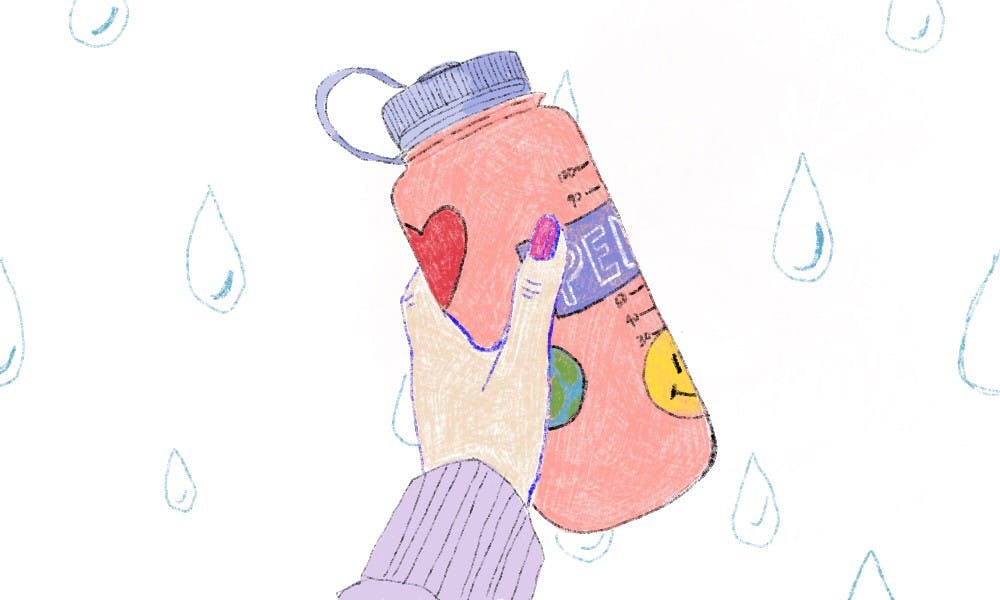Reduce, reuse, recycle.
These three words were hammered into my brain as a kid.
Starting with learning how to plant trees in the elementary school garden, environmental sustainability was a prominent part of my young education experience. Posters on the wall showed a dying cartoon Earth with a little thermostat in its mouth, encouraging the younger generation to “make a difference” and “save the Earth.”
I took all of this in stride. I enjoyed the coloring activities and being granted more time outside during my school day. I was too young to understand the full implications of the activities. I just assumed they were another part of our daily curriculum.
As I grew up and graduated from elementary school, I learned. I learned about oil companies and about greenhouse gas emissions. My science teachers taught me about carbon and that too much in the atmosphere has increased the global temperature of the Earth. In those classes, we created solar cookers and competed to see who could make the best renewable energy oven.
We read articles, invited guest speakers on the topic, and learned about the dooming consequences of our inability to even recycle properly. Of course, I realize now that this way of thinking is somewhat detrimental to the climate movement, as it places most of the responsibility on the individual—especially when that individual is just a middle school student.
After a while, the rhetoric became so normal for me that I didn’t associate it with anything important. Climate change existed. Global warming was an issue. It was happening. I was aware of it.
My first year of college was an awakening for me. I had never lived outside my suburban town of Trumbull, Connecticut. I was used to cookie–cutter houses and a public school where I was surrounded by familiar people. I didn’t travel much as a kid, and it never felt like I really saw the world outside of my suburban bubble.
College thrust me into an entirely new environment and exposed me to perspectives I hadn’t considered. I became more aware of the issues the world faces. I matured into someone more passionate and ready to help fix the problems that mattered to me.
Even with my newfound invigoration, I still didn’t think much of climate change. It remained a background thought for me. Once you’ve experienced something for long enough, it eventually doesn’t register anymore. That’s what makes climate change one of the most dangerous issues humanity faces.
We all know what it is. We’ve seen evidence of its existence. We’ve read the reports saying we have twelve years to change our fates. We’re all aware of the issue. And yet, most of us are still ignorant of it.
I’m still somewhat ignorant of it. It took me until my second year of college to do something. Taking a class centered on climate change, along with doing more research on it, has pushed me to join activist organizations and look for ways to help. I’ve written articles, had debates with friends, and tried to understand what I can do to make a difference.
But before doing anything about climate change, I was complacent about it. I was willing to sit back and let others figure it out. I was content to study for my classes and get through school, ignorant to the fact that each day spent pumping more greenhouse gases into the atmosphere was a day closer to detrimental climate change consequences.
Even now, I wonder if I’m doing enough. Some days, I fall back into my habit of forgetting about climate change. I worry about my own problems—what I’m going to wear the next day, how I’m going to raise my biology grade, or if I have enough dining dollars for a morning coffee. Climate change is such a huge issue, that, at this point, it seems impossible to tackle, especially when I feel like I’m tackling it alone.
But I’m not. None of us are. We’re all in the same boat: worried about climate change, unsure what to do about it, and feeling unprepared to take on something so massive.
Instead of locking ourselves into this hopeless way of thinking, however, I want to stress the importance of looking into different options. Find local groups to join. And if there are none, find friends and start your own. Making a difference doesn’t have to be a full–time job, but it should be something that requires real effort.
Simply put, we are not doing enough. If we were doing enough, this issue would be far in the past. Stop waiting for climate change to fix itself. Stop being aware, but ignorant. If we don’t open our eyes, we’ll soon be staring out at an unrecognizable world. I know I’m not about to let that happen.

